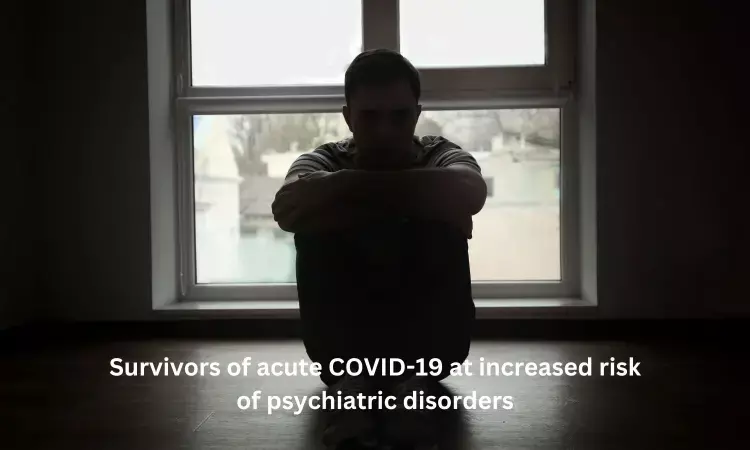- Home
- Medical news & Guidelines
- Anesthesiology
- Cardiology and CTVS
- Critical Care
- Dentistry
- Dermatology
- Diabetes and Endocrinology
- ENT
- Gastroenterology
- Medicine
- Nephrology
- Neurology
- Obstretics-Gynaecology
- Oncology
- Ophthalmology
- Orthopaedics
- Pediatrics-Neonatology
- Psychiatry
- Pulmonology
- Radiology
- Surgery
- Urology
- Laboratory Medicine
- Diet
- Nursing
- Paramedical
- Physiotherapy
- Health news
- Fact Check
- Bone Health Fact Check
- Brain Health Fact Check
- Cancer Related Fact Check
- Child Care Fact Check
- Dental and oral health fact check
- Diabetes and metabolic health fact check
- Diet and Nutrition Fact Check
- Eye and ENT Care Fact Check
- Fitness fact check
- Gut health fact check
- Heart health fact check
- Kidney health fact check
- Medical education fact check
- Men's health fact check
- Respiratory fact check
- Skin and hair care fact check
- Vaccine and Immunization fact check
- Women's health fact check
- AYUSH
- State News
- Andaman and Nicobar Islands
- Andhra Pradesh
- Arunachal Pradesh
- Assam
- Bihar
- Chandigarh
- Chattisgarh
- Dadra and Nagar Haveli
- Daman and Diu
- Delhi
- Goa
- Gujarat
- Haryana
- Himachal Pradesh
- Jammu & Kashmir
- Jharkhand
- Karnataka
- Kerala
- Ladakh
- Lakshadweep
- Madhya Pradesh
- Maharashtra
- Manipur
- Meghalaya
- Mizoram
- Nagaland
- Odisha
- Puducherry
- Punjab
- Rajasthan
- Sikkim
- Tamil Nadu
- Telangana
- Tripura
- Uttar Pradesh
- Uttrakhand
- West Bengal
- Medical Education
- Industry
Acute Covid-19 survivors at increased risk of psychiatric disorders: Expert

Faridabad: The pandemic has taken a heavy toll not only on the physical health of people but also on their mental well-being. A significant proportion of patients in India who survived acute Covid-19 in the last three years are now suffering from some type of mental disorder, with depression and anxiety being the most common. This was said by doctors of Amrita Hospital, Faridabad, in the run-up to World Mental Health Day.
Said Dr. Vikas Gaur, Head of the Psychiatry Department at Amrita Hospital, Faridabad: "In my recent research among people from the general population who suffered from Covid in the last two to three years, about 50% of them are now suffering from mental symptoms of some kind such as depression or anxiety. About 26% of people who were ill with Covid are now suffering from sleep disorders and an equal number from anger-related issues. Interestingly, there is also a substantial rise in the onset of new cases of psychosis, a trend not seen earlier."
The doctor said many people who suffered from Covid-19 are now seeking medical help for cognitive problems related to memory and concentration, which was not seen in the pre-Covid times. "Elderly people above the age of 60 years are especially affected. About 50% of them are now reporting symptoms of significant anxiety, compared to only 2-3% before the pandemic," said Dr. Vikas Gaur.
Patients who got infected with mild to medium cases of Covid and successfully recovered are now suffering from what is being called the Long Covid Syndrome, according to experts. "After physically recovering from Covid, from the third week onwards, many patients are reporting mental health issues such as depression, anxiety, post-traumatic stress disorder, and sleep disorders. These are new cases due to the neuro-psychiatric manifestation of Long Covid. Most such cases being reported today are from females, or from patients who had physical comorbidities or a history of mental disorders in the past," said Dr. Vikas Gaur.
According to the doctor, several theories have been implicated why Covid-19 can trigger mental symptoms. It may significantly increase inflammatory markers in the human brain biologically, which can trigger psychiatric symptoms. Psychosocial issues like loss of job, social isolation, and anxiety about one's job are also shown to be triggering factors for psychiatric symptoms.
It is important that people showing symptoms of mental disorders seek professional help immediately, especially if they got infected with Covid in the recent past. "There are some myths regarding mental illness, such as that suffering from a psychiatric disorder of some kind is a sign of weakness. Due to this, patients avoid getting treatment. According to WHO, only 7% of patients suffering from psychosis are being treated worldwide. In low-income countries, only 3% of depression cases get treated," said Dr. Vikas Gaur.
In 2019, one in every eight people, or 970 million people around the world, were living with a mental disorder, with anxiety and depressive disorders the most common, according to WHO. In 2020, the number of people living with anxiety and depressive disorders rose significantly because of the COVID-19 pandemic. Most people with mental disorders do not have access to effective care.
Read Also - Karnataka man receives India's first shoulder-level arm transplant at Amrita Hospital, Kochi
Medical Dialogues Bureau consists of a team of passionate medical/scientific writers, led by doctors and healthcare researchers. Our team efforts to bring you updated and timely news about the important happenings of the medical and healthcare sector. Our editorial team can be reached at editorial@medicaldialogues.in.


